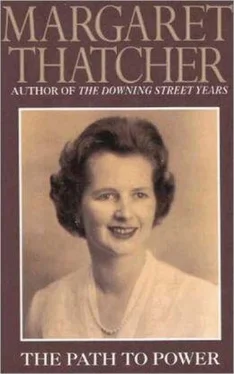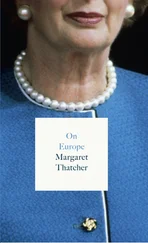For further discussion of the issue of Rhodesia see pp. 417-18.
His death had a particular significance for me, quite apart from the loss of a courageous friend: within days I was assigned a team of personal detectives who have been with me ever since.
See p. 57.
The Attorney-General attempted unsuccessfully to stop NAFF applying for an injunction to prevent the boycott, claiming that he alone had discretion to decide on applications for injunctions from private citizens without standing in the action. The Court of Appeal found in favour of NAFF, but on appeal to the House of Lords the Attorney’s view was upheld.
Hansard, Vol. 961, cc. 712-15, 25 January 1979. Asked whether withdrawal of a union card could constitute intimidation within the meaning of the law, the Attorney-General replied: ‘The answer… must be that it depends on whether the intimidation is of a lawful character.’
In fact, it was not until 1990 that we passed legislation to end the closed shop, making it unlawful to deny people a job because they are, or are not, members of a union, though we had already significantly tightened the law on the closed shop in earlier legislation.
See pp. 368-9.
Our manifesto pledged us to introduce a British Nationality Act defining British citizenship and the right to abode, to set up a register of dependants from Commonwealth countries who had the right of settlement under existing legislation (whose numbers were uncertain) and to establish a quota system to restrict the rate of entry for settlement from non-EC countries. In the event, only the first of these measures was passed into law. During the 1980s primary immigration — the admission of heads of household in their own right — fell significantly, diminishing the number of future dependants with a right of settlement and reducing the overall total below 50,000 in most years, compared to 82,000 in 1975 and 69,000 in 1979.
See pp. 435-8 for a discussion of the 1978 manifesto drafts.
I described some of the subsequent events in The Downing Street Years , pp. 3-4.
See The Downing Street Years, p. 102n. The report showed that SLADE had been using its strength in the printing industry to recruit among freelance artists, photographic studios and advertising agencies by threatening to ‘black’ the printing of their work unless they joined the union. The report’s conclusion was that the union had acted ‘without any regard whatever to the feelings, interests, or welfare of the prospective recruits’.
See The Downing Street Years, pp. 32, 44-5.
Our proposals were distilled into five tasks:
1. To restore the health of our economic and social life, by controlling inflation and striking a fair balance between the rights and duties of the trade union movement.
2. To restore incentives so that hard work pays, success is rewarded and genuine new jobs are created in an expanding economy.
3. To uphold Parliament and the rule of law.
4. To support family life, by helping people to become home-owners, raising the standards of their children’s education, and concentrating welfare services on the effective support of the old, the sick, the disabled and those who are in real need.
5. To strengthen Britain’s defences and work with our allies to protect our interests in an increasingly threatening world.
‘The Dawn Wind’.
The Downing Street Years, pp. 17-19.
I have described the arguments about Europe, which formed the background to my stepping down as Prime Minister, in The Downing Street Years .
See The Downing Street Years, pp. 724-46.
See The Downing Street Years, pp. 90-1.
The Downing Street Years, p. 723.
The Plaza Agreement (March 1985) was an attempt by international finance ministers and central bank governors to bring down the value of the dollar. The markets proved all too obliging. The Louvre Agreement (February 1987) was concluded in the hope of checking the dollar’s fall and bringing about a wider stabilization of currencies — paving the way for Nigel Lawson’s shadowing of the Deutschmark, which began the following month.
In saying this I was bending over backwards to be obliging to the Government, which in fact was unnecessarily worsening the recession by a monetary overkill resulting from an obsession with the exchange rate.
Speech to the Bertelsmann Foundation, 3 April 1992.
See The Downing Street Years, pp. 724-5.
For the full text of the speech see Appendix 1, pp. 609-25.
The Schengen Treaty has been signed and implemented by nine members of the European Union, providing for the removal of border controls between participating states.
Quoted in Mark Almond, Europe’s Backyard War (London, 1994), p. 32.
My concern with this wording led to my having it glossed with the phrase ‘cooperation in economic and monetary policy’ in the text of the Single European Act.
Noel Malcolm, Sense on Sovereignty (Centre for Policy Studies, November 1991), p. 10: ‘The central fault is that they fail to make any distinction between power and authority. That distinction is the basis of all legal understanding: if you do not have the concept of authority as something different from mere power, then you cannot have the concept of law as anything other than the mere application of force.’
Patrick Messerlin, ‘Why such Blindness? European Union Trade Policy at the Crossroads’, in Trade Policy Review (Centre for Policy Studies, September 1994) p. 46.
For example, in the Cohn-Bendit case (1978), 1 CMLR 543, where the conseil d’état simply disregarded previous decisions of the European Court of Justice, decided that Community law could not be invoked in this case affecting public order, and quashed a decision of the lower court to refer the case to the European Court of Justice.
I am indebted to Martin Howe both for these suggestions, made in his pamphlet Europe and the Constitution After Maastricht (Society of Conservative Lawyers, June 1992), and for other helpful and stimulating suggestions which have influenced my thinking on these matters.
I have described this visit in The Downing Street Years, pp. 806-7.
The Downing Street Years, p. 767.
New York Times, 6 August 1992. Copyright © 1992 by The New York Times Company. Reprinted by permission.
Francis Fukuyama, ‘The End of History?’, The National Interest, Summer 1989. In the many subsequent debates it was sometimes forgotten that Mr Fukuyama had qualified his provocative assertion as follows: ‘This is not to say that there will no longer be events to fill the pages of Foreign Affairs ’s yearly summaries of international relations, for the victory of liberalism has occurred primarily in the realm of ideas or consciousness and is as yet incomplete in the real or material world. But there are powerful reasons for believing that it is the ideal that will govern the material world in the long run .’
Читать дальше












